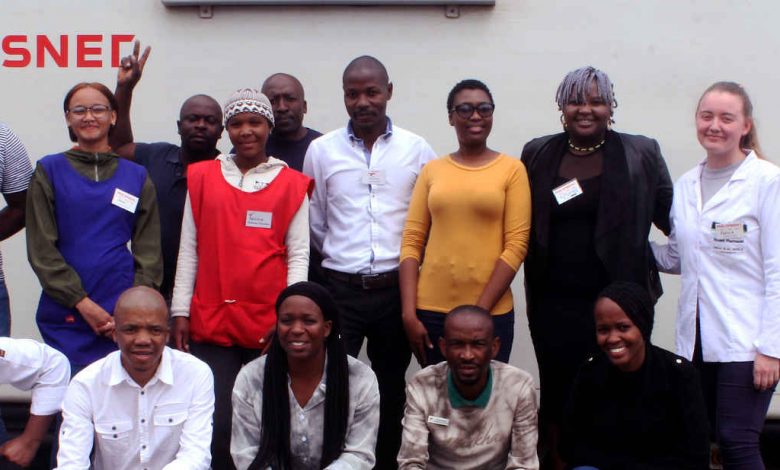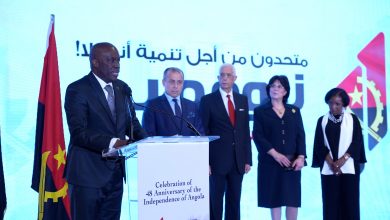In South Africa, medical trains boost mental health services to rural communities | African Development Bank

Diplomat.Today
The African Development Bank
2022-12-21 00:00:00
——————————————-
October’s World Mental Health Day celebrations gave us a chance to reflect on the transformative impact of Transnet’s Phelophepa medical train on mental health in South Africa. Phelophepa has been providing healthcare to rural communities in South Africa for over 20 years.
Darling, Western Cape, South Africa
The early morning air is cool and crisp, but queues are quietly forming along a stretch of railway line in the small town of Darling, a farming community on the western coast of Western Cape, South Africa, about 75 km (46.6 mi) from Cape Town.
Patients queue for Phelophepa train services in Darling, Western Cape
They come from all over the city and neighboring communities – a class of elementary school kids, moms, teens, farmers from the surrounding farms – an eclectic mix.
Nthombi Pukwana, clinical psychologist and acting train manager for the day – and weekend – was host and guide on the day of our visit. Her passion and belief in the Phelophepa mission is tangible.
This Phelophepa Healthcare train, one of two owned and operated by Transnet, is on its penultimate stop before services are shut down for the year for overhaul and rest and recuperation for staff. After more than 30 weeks it has been a long year. The trains run from January to October, approximately 35 to 36 weeks per year, visiting a different rural community within the four selected counties every two weeks.
Both trains feature 19 fully refurbished and equipped coaches, custom designed and built by Transnet Engineering, an operating division of Transnet SOC Ltd. More than 40 permanent employees and numerous final year students and neighborhood volunteers work on the trains.
Pukwana, together with two other trained psychologists and a team of final year students, focuses mainly on preventive interventions for teenagers dealing with problems such as substance abuse, sexuality, anxiety, trauma and grief. Career guidance and family guidance are other important areas of focus.
“Teenagers are starting to explore the world around them. They can’t talk to their parents about substance abuse or their curiosity about drugs or sex. We want to be the adults that kids can talk to without disgust or judgment and be the safe space for them, but we also teach adults how to talk to their kids,” Pukwana said.
Raising awareness of mental health is one of the team’s main objectives – a topic that is neglected by most people. Removing the stereotypes surrounding mental illness and educating channels for help are critical. “Psychology is not really known. The communities don’t have psychologists,” says Pukwana.
Prior to the train’s arrival in a community, social mobilizers are deployed to spread the message, do the groundwork and conduct a needs assessment. In collaboration with local communities and government departments, social services and other partners, the train will make a two-week stop in the selected districts where they share their services.
“They should know about us and they should expect us,” says Pukwana.
The system thus complements and supports existing community health facilities and builds relationships with local healthcare providers. In this way, patients can be referred and continue to receive the care they need after the train has departed. That is important for phycological care, she explains.
Pukwana warns, “Phelephepa is a support structure…it’s there to fill in the gaps. We’re not trying to fix anything. It is important to be able to teach parents and teachers to fill in the role and talk to young children. We try to create those spaces.”

Nhtombi Pukwana, clinical psychologist Transnet Phelophepa train
Achona Vuta, 26, is a registered counselor who initially boarded the train as a senior student for two weeks in 2020. She found the experience so memorable that she had to go back. It was a time of many firsts – her first couples therapy session and first sex education workshop. Grief management and bereavement became her preferred area of discipline, along with equipping teachers to handle stress management and conflict, which are rampant in many rural areas and not just the major suburban cities.
The therapists say the experience of crossing the country highlights the universality of mental health problems in different communities.
For Vuta, the most important lessons from her time on the train are community.
“This train is about community work; and that’s what this train is about. It’s a train for the people. It exposes you to the community and to the reality of what South Africa is,” she says.
“I’ve found that therapy is a safe place, but also a fun place,” she adds.
The trains make mental health care – and high-quality medical care – accessible to South Africa’s most remote communities, where there is often only one doctor for every 5,000 people.
Solomon Quaynor, Vice President for Private Sector, Infrastructure and Industrialization at the African Development Bank, expressed his respect for Phelophepa’s innovative health services, which have received global recognition.
Quaynor said: “Since 2010, the African Development Bank has invested a total of $500 million in Transnet, part of its investment program. While the Phelopepa train touches on that, it is an example of how investments align with our High 5 priorities, such as improving the lives of African people.”
Funding from the African Development Bank has been critical in addressing Transnet’s operational challenges. This includes increasing the freight capacity from 80 tons to 176 tons through the purchase of modern rolling stock. This has improved operational efficiency and helps position the company as a strategic regional player.
Pukwana says that after three years she is far from ready to stop driving.
“It was great… if you look for answers, you will find them,” she says.
Phelophepa Train fast facts:

- The name ‘Phelophepa’ is Sotho and roughly translated means ‘good, clean health’.
- The Phelophepa Healthcare Trains are the only primary healthcare trains in the world. They are recognized as one of the most innovative designs in primary health care in South Africa and worldwide.
- From January 1994 to March 2020, the trains have positively impacted the lives of approximately 12.5 million people, distributed more than half a million pairs of glasses and provided medicines to a
an estimated 800,000 people. - Each year, Phelophepa reaches more than 91,000 patients through its onboard clinics, 200,000 individuals through its outreach programs, and provides experiential learning internship opportunities to more than 1,100 senior students. This also applies to students of international higher education institutions.
- Since its inception, 15,000 community volunteers have participated in a basic health education program, while more than 3 million people have participated in HIV/AIDS and first aid training.
——————————————-



